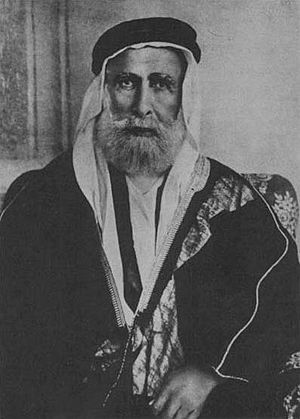Hussein bin Ali, Sharif of Mecca facts for kids
Quick facts for kids Hussein |
|
|---|---|

Sharif Hussein in 1916
|
|
| King of Hejaz | |
| Reign | 10 June 1916 – 3 October 1924 |
| Predecessor | Office established |
| Successor | Ali |
| King of the Arabs | |
| Reign | 10 June 1916 – 19 December 1925 |
| Predecessor | Office established |
| Successor | Office abolished |
| Sharif and Emir of Mecca | |
| Reign | 1 November 1908 – 3 October 1924 |
| Predecessor | Abd al-Ilah Pasha |
| Successor | Ali |
| Born | 1 May 1854 Istanbul, Ottoman Empire |
| Died | (aged 77) Amman, Transjordan |
| Burial | Al-Aqsa Mosque, Jerusalem, British Palestine |
| Spouse |
|
| Issue |
|
| House |
|
| Father | Ali Pasha bin Muhammad |
| Mother | Salha bint Gharam al-Shahar |
| Religion | Sunni Islam |
Hussein bin Ali Al-Hashimi (Arabic: الحسين بن علي الهاشمي, al-Ḥusayn bin ‘Alī al-Hāshimī; 1 May 1854 – 4 June 1931) was an Arab leader from the Banu Hashim clan who was the Sharif and Emir of Mecca from 1908 and, after proclaiming the Great Arab Revolt against the Ottoman Empire, King of the Hejaz from 1916 to 1924. At the end of his reign he also briefly laid claim to the office of Caliph. He was a 37th-generation direct descendant of Muhammad, as he belongs to the Hashemite family.
A member of the Awn clan of the Qatadid emirs of Mecca, he was perceived to have rebellious inclinations and in 1893 was summoned to Constantinople, where he was kept on the Council of State. In 1908, in the aftermath of the Young Turk Revolution, he was appointed Emir of Mecca by Sultan Abdul Hamid II. In 1916, with the promise of British support for Arab independence, he proclaimed the Arab Revolt against the Ottoman Empire, accusing the Committee of Union and Progress of violating tenets of Islam and limiting the power of the sultan-caliph. Shortly after the outbreak of the revolt, Hussein declared himself 'King of the Arab Countries'. However, his pan-Arab aspirations were not accepted by the Allies, who recognised him only as King of the Hejaz.
After World War I Hussein refused to ratify the Treaty of Versailles, in protest at the Balfour Declaration and the establishment of British and French mandates in Syria, Iraq, and Palestine. He later refused to sign the Anglo-Hashemite Treaty and thus deprived himself of British support when his kingdom was invaded by Ibn Saud. In March 1924, when the Ottoman Caliphate was abolished, Hussein proclaimed himself Caliph of all Muslims. In October 1924, facing defeat by Ibn Saud, he abdicated and was succeeded as king by his eldest son Ali. His sons Faisal and Abdullah were made rulers of Iraq and Transjordan respectively in 1921.
Images for kids
-
Drawing by Khalil Gibran, 1916
See also
 In Spanish: Husayn ibn Ali (jerife de La Meca) para niños
In Spanish: Husayn ibn Ali (jerife de La Meca) para niños





